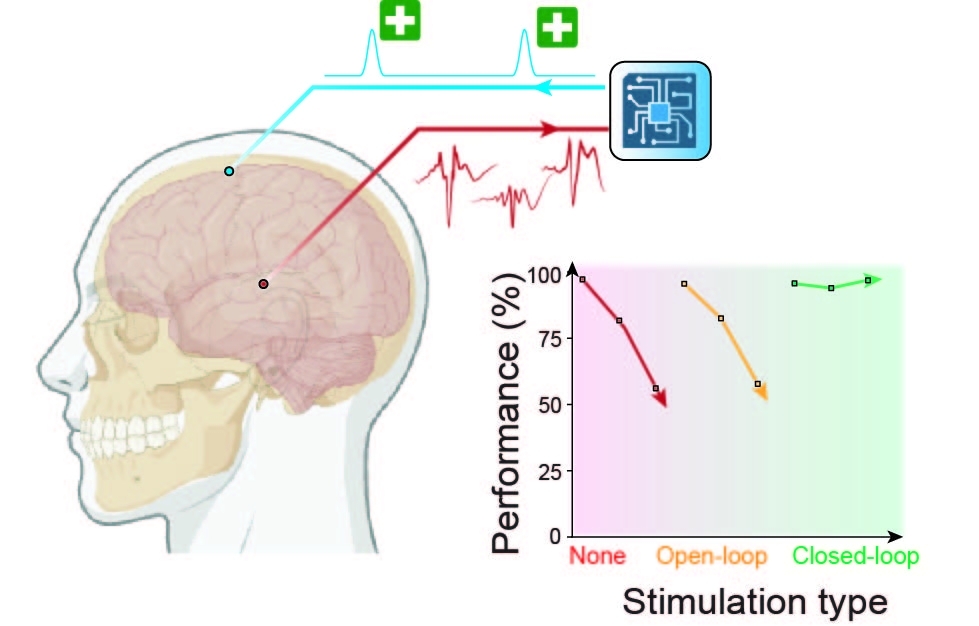Preventing Epilepsy Progression and Preserving Long-Term Memory
An interdisciplinary collaboration between clinicians and engineers identifies a potential new treatment for preventing epilepsy progression and preserving long-term memory.

June 24, 2025 - Most people associate epilepsy with seizures, but what many don’t realize is that the abnormal brain activity patterns associated with epilepsy can also negatively impact the brain, affecting memory, communication and learning. As an associate professor of anatomy and neurobiology in the UC Irvine School of Medicine and a board-certified child neurologist at Children’s Hospital of Orange County (CHOC), Jennifer Gelinas, MD, PhD, understands how epileptic activity can disrupt intellectual development. In the Epilepsy and Cognition Lab, she leads experimental studies that not only explore how to stop seizures but also address the debilitating impact of cognitive-related symptoms associated with progressive epilepsy.
“My work with patients at CHOC is the inspiration for these kinds of experiments,” says Gelinas. “I see firsthand the effects of worsening epilepsy, as well as cognitive and behavioral problems, on children with epilepsy and their families.”
To better understand what is going on in the brain when epilepsy is progressing, Gelinas helped lead a collaborative study with researchers, doctors and engineers from UC Irvine, Columbia University, Toyohashi University of Technology in Japan, and the Comprehensive Epilepsy Center in New York. The two lead authors of the study, Jose J. Ferrero and Ahnaf R. Hassan, are research trainees in the Epilepsy and Cognition Lab. The findings of the work are outlined in a paper in Nature Neuroscience, “Closed-loop electrical stimulation to prevent focal epilepsy progression and long-term memory impairment.”
Their findings identify a potential new treatment option for preventing epilepsy progression and preserving long-term memory.
Better Understanding Epilepsy Progression
The researchers set out to explore why some patients experience progressive worsening of their epilepsy and cognitive dysfunction and how to address it. They focused on interictal epileptiform discharges (IEDs), which are a ubiquitous pathologic finding in the brain signals of patients with epilepsy.
“We found that IEDs generate abnormal brain activity in other connected brain regions,” says Gelinas. This abnormal coupling of activity between different regions of the brain expands the ability to produce IEDs and is associated with the progression of epilepsy. Furthermore, this coupling of activity impairs long-term memory in an animal model of epilepsy.

“We designed a closed-loop electrical stimulation protocol to eliminate this abnormal coupling,” says Gelinas, “and were able to prevent the spread of the epileptic network and preserve the long-term memory of the animals despite ongoing seizures.”
She credits the interdisciplinary nature of the work for their success. “The collaboration with Dion Khodagholy and his team in UCI engineering has been critical,” says Gelinas. “In order to be effective, the device responsible for the closed-loop electrical stimulation must be able to accurately sense when abnormal brain signals are occurring and deliver responsive electrical stimulation at low latency. Additionally, the device needs to be compatible with a freely behaving animal and scalable for potential translation to human subjects.”
A New Target for Treatment
Current epilepsy treatments primarily aim to control seizures, and there are no treatments for cognitive dysfunction. This study suggests that IEDs could be an important target for addressing both issues. “We are now working to create a device that can replicate our closed-loop electrical stimulation protocol in human subjects,” says Gelinas. “Given the encouraging results of our work, we are primed to move to human subject testing with the goal of improving patient outcomes and quality of life.”
- Shani Murray/UCI School of Medicine
